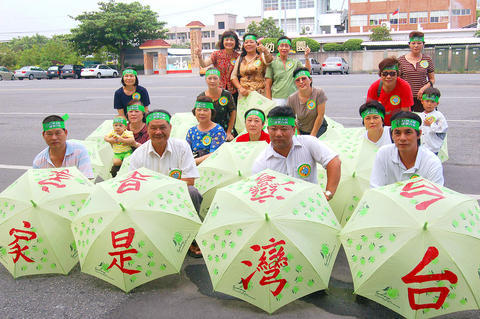Taiwan's application for UN membership represents the political will to self-determination of all Taiwanese people, and the UN, the US and the international community should support the idea that the nation belongs in the UN, US academics said yesterday.
As Article 55 of the UN Charter stipulates that the organization respects self-determination of peoples and promotes human rights, the UN General Assembly and the Secretariat have no right to reject Taiwan's application, Jordan Paust, a law professor at the University of Houston, said in an address to a conference on Taiwan's UN application hosted by the Taiwan Foundation for Democracy in Taipei yesterday.
"Taiwan functions as an independent state and it is time for Taiwanese self-determination to ripen into a far more widely recognized statehood status for Taiwan and membership in the United Nations," he said.

PHOTO: HUANG MING-TANG, TAIPEI TIMES
Citing Article 55 and Article 100 of the UN Charter, which states that the Secretary-General and the staff "shall refrain from any action which might reflect on their position as international officials responsible only to the Organization," Paust accused the UN Secretariat of violating its mandate when it returned Taiwan's application in July.
President Chen Shui-bian (
Chen's letter to the UN General Assembly protesting Ban's move earlier this month was also rejected.
Paust condemned the UN General Assembly and the Secretariat, and said that China, as a member of the UN, had no authority to deny Taiwanese people self-determination and human rights by vetoing the nation's membership application.
Although the International Court of Justice has not found any Security Council decision to be ultra vires ("beyond its powers") under the Charter, Paust said that Taiwan should ask its allies to demand that the UN General Assembly request an advisory opinion from the International Court of Justice on the propriety of a particular decision of the Council or an attempted veto by one of its permanent members.
Joining Paust in support of Taiwan's application, Dennis Hickey, a professor of international affairs at Missouri State University, called on US President George W. Bush's administration to employ "quiet diplomacy" and assist Taiwan with its UN application.
"The US should gently nudge other countries, including China, toward the idea that Taiwan belongs in the UN -- if only as an observer or non-state actor," he said.
As a creative strategy to help Taiwan be accepted as a UN member, Hickey urged the US to have other countries introduce a resolution to support Taiwan's participation as an "observer" under the name of "Chinese Taipei" at the same time when Taiwan submitted its proposal to join the UN as "Taiwan."
While the Democratic Progressive Party's (DPP) UN application may be rejected, the resolution should be a solution to resolve the thorny Taiwan representation issue and create a "win-win-win" situation for Chen's government, the Chinese Nationalist Party (KMT) and China, Hickey said.
"Any resolution will require new thinking, compromise and multilateral cooperation among numerous governments," he said.

The High Prosecutors’ Office yesterday withdrew an appeal against the acquittal of a former bank manager 22 years after his death, marking Taiwan’s first instance of prosecutors rendering posthumous justice to a wrongfully convicted defendant. Chu Ching-en (諸慶恩) — formerly a manager at the Taipei branch of BNP Paribas — was in 1999 accused by Weng Mao-chung (翁茂鍾), then-president of Chia Her Industrial Co, of forging a request for a fixed deposit of US$10 million by I-Hwa Industrial Co, a subsidiary of Chia Her, which was used as collateral. Chu was ruled not guilty in the first trial, but was found guilty

DEADLOCK: As the commission is unable to forum a quorum to review license renewal applications, the channel operators are not at fault and can air past their license date The National Communications Commission (NCC) yesterday said that the Public Television Service (PTS) and 36 other television and radio broadcasters could continue airing, despite the commission’s inability to meet a quorum to review their license renewal applications. The licenses of PTS and the other channels are set to expire between this month and June. The National Communications Commission Organization Act (國家通訊傳播委員會組織法) stipulates that the commission must meet the mandated quorum of four to hold a valid meeting. The seven-member commission currently has only three commissioners. “We have informed the channel operators of the progress we have made in reviewing their license renewal applications, and

‘DENIAL DEFENSE’: The US would increase its military presence with uncrewed ships, and submarines, while boosting defense in the Indo-Pacific, a Pete Hegseth memo said The US is reorienting its military strategy to focus primarily on deterring a potential Chinese invasion of Taiwan, a memo signed by US Secretary of Defense Pete Hegseth showed. The memo also called on Taiwan to increase its defense spending. The document, known as the “Interim National Defense Strategic Guidance,” was distributed this month and detailed the national defense plans of US President Donald Trump’s administration, an article in the Washington Post said on Saturday. It outlines how the US can prepare for a potential war with China and defend itself from threats in the “near abroad,” including Greenland and the Panama

Taiwan People’s Party (TPP) Chairman Huang Kuo-chang (黃國昌) yesterday appealed to the authorities to release former Taipei mayor Ko Wen-je (柯文哲) from pretrial detention amid conflicting reports about his health. The TPP at a news conference on Thursday said that Ko should be released to a hospital for treatment, adding that he has blood in his urine and had spells of pain and nausea followed by vomiting over the past three months. Hsieh Yen-yau (謝炎堯), a retired professor of internal medicine and Ko’s former teacher, said that Ko’s symptoms aligned with gallstones, kidney inflammation and potentially dangerous heart conditions. Ko, charged with